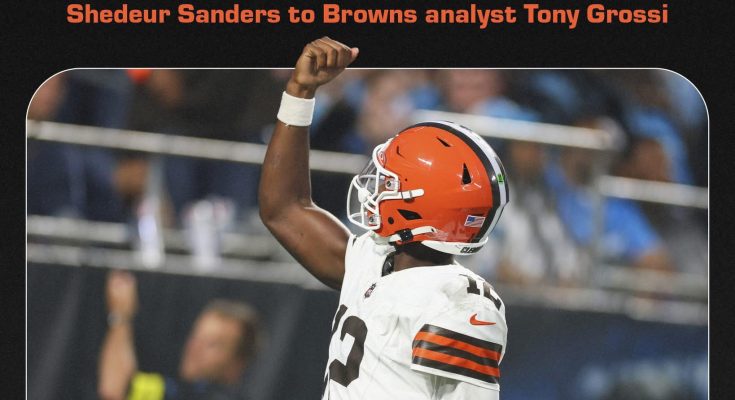Shedeur Sanders, the freshly minted Cleveland Browns rookie quarterback, provided more than just a fireworks display on the field in his preseason debut on August 8, 2025—he delivered a viral moment lurking just beyond the end zone. After orchestrating a commanding 30-10 victory over the Carolina Panthers—completing 14 of 23 passes for 138 yards and two touchdowns while flashing his nimble legs elsewhere—the son of Hall of Famer Deion Sanders delivered a succinct, lighthearted challenge to longtime Browns beat reporter Tony Grossi that quickly became the talk of the NFL world.
Once the final whistle blew and the cameras wound down, Sanders encountered Grossi in the dank bowels of Bank of America Stadium, the hushed corridors where truth often collides with PR. In a moment capturing both self-awareness and a budding swagger, Sanders looked him dead in the eye and said with playful earnestness: “Tony, I be hoping you got something positive to say about me. You only say negative stuff about me. And I’m like, ‘I ain’t do nothing to you.’” That was just the beginning. After a beat of awkward silence, Sanders leaned in a little closer, grinned, and added, “I ain’t seen nothing positive you ever said.” Then, as he walked away, almost as an afterthought, came the soft but burning question: “What I do? What I do to you, Tony?”
It was the kind of polite confrontation often preached in leadership workshops—but with far more bite and authenticity. Sanders, typically measured in posture and comments, showed a willingness to hold the media to account, even while maintaining a friendly facade. Laughing as the exchange closed, he didn’t shrink from pushing back; he did it with humor—a powerful reminder that athletes are not mere subjects but participants in their narratives.
Critics of Grossi had speculated for weeks that his tone toward Sanders veered toward unnecessary negativity. Sanders and many fans felt the reporting overlooked his college accolades—Big 12 Offensive Player of the Year in 2024, winner of the Johnny Unitas Golden Arm Award, and a decorated collegiate career. His drop from a projected early pick to the fifth round at No. 144 had already set a dramatic arc in motion, followed by his polished, impactful preseason debut. The interplay between performance and perception was laid bare by this brief moment.
Grossi’s reputation in the Cleveland media landscape is built on skepticism—some would even argue cynicism. He’s a seasoned reporter whose brusque style and pointed remarks have made him both respected and reviled. But even he couldn’t hold back praise for Sanders after the game, admitting on ESPN Cleveland that Sanders “was outstanding” and later writing on X that “He put the pressure on QB2 Kenny Pickett and QB3 Dillon Gabriel to get healthy and perform next week.” That acknowledgment indicated Sanders’s words had landed—not as belligerence, but as a reasonable request for balance.
Beyond the wit and camera angles, the encounter sparked deeper discussions about athlete-media dynamics in the age of social media. Sanders’s half-brother, Deion Sanders Jr., posted the clip on YouTube, turning it into a viral splash that rippled across platforms. Was Sanders simply goofing? No—he was branding. He was staking his claim not just as a quarterback to watch, but as a media-savvy, self-aware public figure unafraid to challenge narratives that don’t align with his reality.
Fan reactions on Reddit and elsewhere showed a mix of admiration and amusement. Some praised the young quarterback’s poise:
“Especially the way he did it, with humor and respect. He made his point and they both had a laugh and moved on. Love to see this young man show signs of growth.”
Others expressed support for Sanders’s boldness, nodding to the broader frustration with how media can overshadow an athlete’s actual performance:
“I have zero problem with Sanders calling his trash out.”
“He broaches the subject respectfully and almost playfully … This is a perfectly professional and decent way to interact … especially if the reporter is dragging him all the time.”
Yet a few defenders of Grossi reminded readers that he’s been covering the Browns for decades and deserves at least some credit for knowledge and dedication.
At its core, the exchange stands as a snapshot of a modern athlete asserting control over his public narrative. Sanders—born in February 2002 and steeped in football lore as Deion’s son—already brings the weight of legacy. Yet he also brings fresh talent: He starred at both Jackson State and Colorado, winning numerous awards such as the Jerry Rice Award, Deacon Jones Trophy, second-team All-American honors, and the prestigious Johnny Unitas Golden Arm Award in 2024. His college jersey was even retired by Colorado, a rarity for someone so young.
Drafted by Cleveland in April 2025, Sanders signed a four-year deal worth $4.6 million, becoming one of the more high-profile rookies in a tightly contested quarterback room headlined by Joe Flacco, plus Kenny Pickett and Dillon Gabriel. Head coach Kevin Stefanski has already indicated that Sanders will get abundant reps in the preseason, giving him every opportunity to prove that his field performance matches the attention he’s grabbing off it.
The moment with Grossi also sparked reflection about media responsibility. Athletes are humans, and the adage that “the media has the right to question” doesn’t absolve sportswriters from fairness. Sanders’s playful but pointed challenge underscored that media coverage isn’t just commentary—it shapes reputations, brand, and opportunity.
Shedeur Sanders’s rookie moment wasn’t just measured in yards and touchdowns, but in message: quietly confident, self-assertive, authentic. He demanded recognition not just for stat sheets, but for who he is. In under 30 seconds, he reframed the narrative from “controversial first-rounder who fell” to “rookie QB who confronts negativity with wit and grace.”
As the preseason progresses, all eyes will remain on Sanders—on his throws, his composure, his growth. But after Thursday night, we know this young athlete also has something powerful: presence. In a crowded media room, he didn’t just ask for positive press—he earned it.



